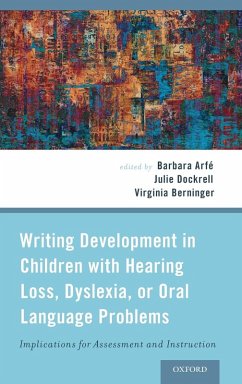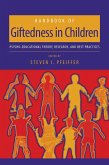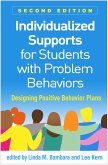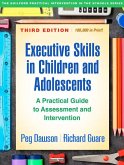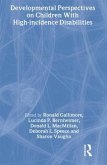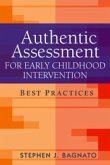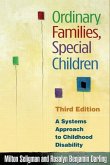Barbara Arfe, Julie Dockrell, Virginia Berninger
Writing Development in Children with Hearing Loss, Dyslexia, or Oral Language Problems
Implications for Assessment and Instruction
Barbara Arfe, Julie Dockrell, Virginia Berninger
Writing Development in Children with Hearing Loss, Dyslexia, or Oral Language Problems
Implications for Assessment and Instruction
- Gebundenes Buch
- Merkliste
- Auf die Merkliste
- Bewerten Bewerten
- Teilen
- Produkt teilen
- Produkterinnerung
- Produkterinnerung
Difficulties with writing are considered one of the most common learning problems in school children. This volume focuses on the causes and nature of writing problems in children with hearing loss, oral language problems, and dyslexia. Its goal is to provide current understandings to help guide and support writing assessment and intervention.
Andere Kunden interessierten sich auch für
![Handbook of Giftedness in Children Handbook of Giftedness in Children]() Steven I. Pfeiffer (ed.)Handbook of Giftedness in Children116,99 €
Steven I. Pfeiffer (ed.)Handbook of Giftedness in Children116,99 €![Individualized Supports for Students with Problem Behaviors Individualized Supports for Students with Problem Behaviors]() Individualized Supports for Students with Problem Behaviors101,99 €
Individualized Supports for Students with Problem Behaviors101,99 €![Executive Skills in Children and Adolescents Executive Skills in Children and Adolescents]() Peg DawsonExecutive Skills in Children and Adolescents85,99 €
Peg DawsonExecutive Skills in Children and Adolescents85,99 €![Developmental Perspectives on Children with High-Incidence Disabilities Developmental Perspectives on Children with High-Incidence Disabilities]() Developmental Perspectives on Children with High-Incidence Disabilities198,99 €
Developmental Perspectives on Children with High-Incidence Disabilities198,99 €![Authentic Assessment for Early Childhood Intervention Authentic Assessment for Early Childhood Intervention]() Stephen J BagnatoAuthentic Assessment for Early Childhood Intervention69,99 €
Stephen J BagnatoAuthentic Assessment for Early Childhood Intervention69,99 €![Coaching Students with Executive Skills Challenges Coaching Students with Executive Skills Challenges]() Peg DawsonCoaching Students with Executive Skills Challenges71,99 €
Peg DawsonCoaching Students with Executive Skills Challenges71,99 €![Ordinary Families, Special Children Ordinary Families, Special Children]() Milton SeligmanOrdinary Families, Special Children95,99 €
Milton SeligmanOrdinary Families, Special Children95,99 €-
-
-
Difficulties with writing are considered one of the most common learning problems in school children. This volume focuses on the causes and nature of writing problems in children with hearing loss, oral language problems, and dyslexia. Its goal is to provide current understandings to help guide and support writing assessment and intervention.
Hinweis: Dieser Artikel kann nur an eine deutsche Lieferadresse ausgeliefert werden.
Hinweis: Dieser Artikel kann nur an eine deutsche Lieferadresse ausgeliefert werden.
Produktdetails
- Produktdetails
- Verlag: Oxford University Press
- Seitenzahl: 384
- Erscheinungstermin: 7. August 2014
- Englisch
- Abmessung: 241mm x 162mm x 32mm
- Gewicht: 684g
- ISBN-13: 9780199827282
- ISBN-10: 0199827281
- Artikelnr.: 47869352
- Herstellerkennzeichnung
- Libri GmbH
- Europaallee 1
- 36244 Bad Hersfeld
- gpsr@libri.de
- Verlag: Oxford University Press
- Seitenzahl: 384
- Erscheinungstermin: 7. August 2014
- Englisch
- Abmessung: 241mm x 162mm x 32mm
- Gewicht: 684g
- ISBN-13: 9780199827282
- ISBN-10: 0199827281
- Artikelnr.: 47869352
- Herstellerkennzeichnung
- Libri GmbH
- Europaallee 1
- 36244 Bad Hersfeld
- gpsr@libri.de
Barbara Arfé is Researcher and Professor of Developmental and Educational Psychology at the University of Padova. Her main research interest is the nature and causes of reading and writing problems in children with hearing loss. On these topics she is currently running national and international research projects. Virginia Wise Berninger is Professor of Learning Sciences and Human Development at the University of Washington, where she is Principal Investigator and Director of the NICHD-funded Multidisciplinary Learning Disabilities Research Center that studies oral and written language learners (OWLs) with and without dysgraphia, dyslexia, and OWL LD. Julie Dockrell is Professor of Psychology and Special Needs at the Institute Of Education, London, and a qualified clinical and educational psychologist. She continues to do work in schools and collaborate with voluntary agencies supporting children's language and writing development. Her major research interests are in patterns of development and the ways in which cognitive factors impact on children's learning, interaction and attainments. She was co-director of the Better Communication Research Programme, the largest UK study on language and communication needs.
* Foreword
* Introduction
* Part 1
* Introduction: Models and Perspectives on Writing Development:
Implications for Assessment and Instruction
* Chapter 1. Cognitive Processes in Writing: A Framework
* John R. Hayes and Virginia Berninger
* Chapter 2. Linguistic Perspectives on Writing Development
* Ruth Berman
* Chapter 3. Two Metaphors for Writing Research and Their Implications
for Writing Instruction
* Pietro Boscolo
* Part 2
* The impact of oral language skills on written text production
* Chapter 4. Spelling in Deaf Children with Cochlear Implants:
Implications for Instruction
* Heather Hayes, Rebecca Treiman, and Ann E. Geers
* Chapter 5. Spelling Acquisition in French Children with Cochlear
Implants: A Case-Study Investigation
* Sophie Bouton and Pascale Colé
* Chapter 6. Spelling Abilities in Hebrew-Speaking Children with
Hearing Loss
* Ronit Levie, Dorit Ravid, Tal Freud and Tova Most
* Chapter 7. The Influence of Verbal Working Memory on Writing Skills
in Children with Hearing Loss
* Barbara Arfe, Federica Nicolini, and Elena Pozzebon
* Chapter 8. Composing Academic Essays: Using Dictation and Technology
to Improve Fluency
* John Albertini, Michael Stinson, and Argiroula Zangana
* Chapter 9. Examining Early Spelling and Writing Skills: A Comparative
Analysis of Kindergarteners with Speech and Oral Language Impairments
and Their Typically Developing Peers
* Cynthia S. Puranik, Stephanie Al Otaiba, and Feifei Ye
* Chapter 10. Morphological Awareness and Spelling Difficulties in
French-Speaking Children
* Monique Sénéchal
* Chapter 11. Writing Abilities of Pre-Adolescents with and without
Oral language/Learning Impairment in Restructuring an Informative
Text
* Orna Davidi and Ruth A. Berman
* Chapter 12. Writing Development of Spanish-English Bilingual Students
with Language Learning Disabilities: New Directions in Constructing
Individual Profiles
* Robin L. Danzak and Elaine R. Silliman
* Chapter 13. Written Narratives from French and English Speaking
Children with Language Impairment
* Judy S. Reilly, Josie Bernicot, Thierry Olive, Joël Uzé, Beverly
Wulfeck, Monik Favart, Mark Appelbaum
* Children with Dyslexia
* Chapter 14. A Review of Dyslexia and Expressive Writing in English
* Emma Sumner, Vincent Connelly, and Anna L. Barnett
* Chapter 15. Written Spelling in French Children with Dyslexia
* Séverine Casalis
* Chapter 16. Written Spelling in Spanish- Speaking Children with
Dyslexia
* Francisca Serrano and Sylvia Defior
* Chapter 17. The Writing Development of Brazilian children with
Dyslexia: An Evidence-Based Clinical Approach
* Jane Correa
* Chapter 18. Expressive Writing in Swedish 15-year-olds with Reading
and Writing Difficulties
* Åsa Wengelin, Roger Johansson and Victoria Johansson
* Chapter 19. Improving Expressive Writing in Learning Disabled
Children: The Effects of a Training Focused on Revision
* Martina Pedron, Anna Maria Re, Chiara Mirandola, and Cesare Cornoldi
* Part 3
* Linking Research to Practice in Oral and Written Language Assessment
and Intervention
* Chapter 20. Integrating Language Assessment, Instruction, and
Intervention in an Inclusive Writing Lab Approach
* Nickola Wolf Nelson
* Chapter 21. Integrating Oral and Written Language into a New Practice
Model: Perspectives of an Oral Language Researcher and Practitioner
* Elaine R. Silliman
* Chapter 22. Integrating Writing and Oral Language Disorders in
Assessment: Perspectives of a Writing Researcher
* Vincent Connelly
* Chapter 23. The Role of Oral Language in Developing Written Language
Skills: Questions for European Pedagogy?
* Julie Dockrell and Barbara Arfé
* Bridging Research and Practice: Conclusions
* Introduction
* Part 1
* Introduction: Models and Perspectives on Writing Development:
Implications for Assessment and Instruction
* Chapter 1. Cognitive Processes in Writing: A Framework
* John R. Hayes and Virginia Berninger
* Chapter 2. Linguistic Perspectives on Writing Development
* Ruth Berman
* Chapter 3. Two Metaphors for Writing Research and Their Implications
for Writing Instruction
* Pietro Boscolo
* Part 2
* The impact of oral language skills on written text production
* Chapter 4. Spelling in Deaf Children with Cochlear Implants:
Implications for Instruction
* Heather Hayes, Rebecca Treiman, and Ann E. Geers
* Chapter 5. Spelling Acquisition in French Children with Cochlear
Implants: A Case-Study Investigation
* Sophie Bouton and Pascale Colé
* Chapter 6. Spelling Abilities in Hebrew-Speaking Children with
Hearing Loss
* Ronit Levie, Dorit Ravid, Tal Freud and Tova Most
* Chapter 7. The Influence of Verbal Working Memory on Writing Skills
in Children with Hearing Loss
* Barbara Arfe, Federica Nicolini, and Elena Pozzebon
* Chapter 8. Composing Academic Essays: Using Dictation and Technology
to Improve Fluency
* John Albertini, Michael Stinson, and Argiroula Zangana
* Chapter 9. Examining Early Spelling and Writing Skills: A Comparative
Analysis of Kindergarteners with Speech and Oral Language Impairments
and Their Typically Developing Peers
* Cynthia S. Puranik, Stephanie Al Otaiba, and Feifei Ye
* Chapter 10. Morphological Awareness and Spelling Difficulties in
French-Speaking Children
* Monique Sénéchal
* Chapter 11. Writing Abilities of Pre-Adolescents with and without
Oral language/Learning Impairment in Restructuring an Informative
Text
* Orna Davidi and Ruth A. Berman
* Chapter 12. Writing Development of Spanish-English Bilingual Students
with Language Learning Disabilities: New Directions in Constructing
Individual Profiles
* Robin L. Danzak and Elaine R. Silliman
* Chapter 13. Written Narratives from French and English Speaking
Children with Language Impairment
* Judy S. Reilly, Josie Bernicot, Thierry Olive, Joël Uzé, Beverly
Wulfeck, Monik Favart, Mark Appelbaum
* Children with Dyslexia
* Chapter 14. A Review of Dyslexia and Expressive Writing in English
* Emma Sumner, Vincent Connelly, and Anna L. Barnett
* Chapter 15. Written Spelling in French Children with Dyslexia
* Séverine Casalis
* Chapter 16. Written Spelling in Spanish- Speaking Children with
Dyslexia
* Francisca Serrano and Sylvia Defior
* Chapter 17. The Writing Development of Brazilian children with
Dyslexia: An Evidence-Based Clinical Approach
* Jane Correa
* Chapter 18. Expressive Writing in Swedish 15-year-olds with Reading
and Writing Difficulties
* Åsa Wengelin, Roger Johansson and Victoria Johansson
* Chapter 19. Improving Expressive Writing in Learning Disabled
Children: The Effects of a Training Focused on Revision
* Martina Pedron, Anna Maria Re, Chiara Mirandola, and Cesare Cornoldi
* Part 3
* Linking Research to Practice in Oral and Written Language Assessment
and Intervention
* Chapter 20. Integrating Language Assessment, Instruction, and
Intervention in an Inclusive Writing Lab Approach
* Nickola Wolf Nelson
* Chapter 21. Integrating Oral and Written Language into a New Practice
Model: Perspectives of an Oral Language Researcher and Practitioner
* Elaine R. Silliman
* Chapter 22. Integrating Writing and Oral Language Disorders in
Assessment: Perspectives of a Writing Researcher
* Vincent Connelly
* Chapter 23. The Role of Oral Language in Developing Written Language
Skills: Questions for European Pedagogy?
* Julie Dockrell and Barbara Arfé
* Bridging Research and Practice: Conclusions
* Foreword
* Introduction
* Part 1
* Introduction: Models and Perspectives on Writing Development:
Implications for Assessment and Instruction
* Chapter 1. Cognitive Processes in Writing: A Framework
* John R. Hayes and Virginia Berninger
* Chapter 2. Linguistic Perspectives on Writing Development
* Ruth Berman
* Chapter 3. Two Metaphors for Writing Research and Their Implications
for Writing Instruction
* Pietro Boscolo
* Part 2
* The impact of oral language skills on written text production
* Chapter 4. Spelling in Deaf Children with Cochlear Implants:
Implications for Instruction
* Heather Hayes, Rebecca Treiman, and Ann E. Geers
* Chapter 5. Spelling Acquisition in French Children with Cochlear
Implants: A Case-Study Investigation
* Sophie Bouton and Pascale Colé
* Chapter 6. Spelling Abilities in Hebrew-Speaking Children with
Hearing Loss
* Ronit Levie, Dorit Ravid, Tal Freud and Tova Most
* Chapter 7. The Influence of Verbal Working Memory on Writing Skills
in Children with Hearing Loss
* Barbara Arfe, Federica Nicolini, and Elena Pozzebon
* Chapter 8. Composing Academic Essays: Using Dictation and Technology
to Improve Fluency
* John Albertini, Michael Stinson, and Argiroula Zangana
* Chapter 9. Examining Early Spelling and Writing Skills: A Comparative
Analysis of Kindergarteners with Speech and Oral Language Impairments
and Their Typically Developing Peers
* Cynthia S. Puranik, Stephanie Al Otaiba, and Feifei Ye
* Chapter 10. Morphological Awareness and Spelling Difficulties in
French-Speaking Children
* Monique Sénéchal
* Chapter 11. Writing Abilities of Pre-Adolescents with and without
Oral language/Learning Impairment in Restructuring an Informative
Text
* Orna Davidi and Ruth A. Berman
* Chapter 12. Writing Development of Spanish-English Bilingual Students
with Language Learning Disabilities: New Directions in Constructing
Individual Profiles
* Robin L. Danzak and Elaine R. Silliman
* Chapter 13. Written Narratives from French and English Speaking
Children with Language Impairment
* Judy S. Reilly, Josie Bernicot, Thierry Olive, Joël Uzé, Beverly
Wulfeck, Monik Favart, Mark Appelbaum
* Children with Dyslexia
* Chapter 14. A Review of Dyslexia and Expressive Writing in English
* Emma Sumner, Vincent Connelly, and Anna L. Barnett
* Chapter 15. Written Spelling in French Children with Dyslexia
* Séverine Casalis
* Chapter 16. Written Spelling in Spanish- Speaking Children with
Dyslexia
* Francisca Serrano and Sylvia Defior
* Chapter 17. The Writing Development of Brazilian children with
Dyslexia: An Evidence-Based Clinical Approach
* Jane Correa
* Chapter 18. Expressive Writing in Swedish 15-year-olds with Reading
and Writing Difficulties
* Åsa Wengelin, Roger Johansson and Victoria Johansson
* Chapter 19. Improving Expressive Writing in Learning Disabled
Children: The Effects of a Training Focused on Revision
* Martina Pedron, Anna Maria Re, Chiara Mirandola, and Cesare Cornoldi
* Part 3
* Linking Research to Practice in Oral and Written Language Assessment
and Intervention
* Chapter 20. Integrating Language Assessment, Instruction, and
Intervention in an Inclusive Writing Lab Approach
* Nickola Wolf Nelson
* Chapter 21. Integrating Oral and Written Language into a New Practice
Model: Perspectives of an Oral Language Researcher and Practitioner
* Elaine R. Silliman
* Chapter 22. Integrating Writing and Oral Language Disorders in
Assessment: Perspectives of a Writing Researcher
* Vincent Connelly
* Chapter 23. The Role of Oral Language in Developing Written Language
Skills: Questions for European Pedagogy?
* Julie Dockrell and Barbara Arfé
* Bridging Research and Practice: Conclusions
* Introduction
* Part 1
* Introduction: Models and Perspectives on Writing Development:
Implications for Assessment and Instruction
* Chapter 1. Cognitive Processes in Writing: A Framework
* John R. Hayes and Virginia Berninger
* Chapter 2. Linguistic Perspectives on Writing Development
* Ruth Berman
* Chapter 3. Two Metaphors for Writing Research and Their Implications
for Writing Instruction
* Pietro Boscolo
* Part 2
* The impact of oral language skills on written text production
* Chapter 4. Spelling in Deaf Children with Cochlear Implants:
Implications for Instruction
* Heather Hayes, Rebecca Treiman, and Ann E. Geers
* Chapter 5. Spelling Acquisition in French Children with Cochlear
Implants: A Case-Study Investigation
* Sophie Bouton and Pascale Colé
* Chapter 6. Spelling Abilities in Hebrew-Speaking Children with
Hearing Loss
* Ronit Levie, Dorit Ravid, Tal Freud and Tova Most
* Chapter 7. The Influence of Verbal Working Memory on Writing Skills
in Children with Hearing Loss
* Barbara Arfe, Federica Nicolini, and Elena Pozzebon
* Chapter 8. Composing Academic Essays: Using Dictation and Technology
to Improve Fluency
* John Albertini, Michael Stinson, and Argiroula Zangana
* Chapter 9. Examining Early Spelling and Writing Skills: A Comparative
Analysis of Kindergarteners with Speech and Oral Language Impairments
and Their Typically Developing Peers
* Cynthia S. Puranik, Stephanie Al Otaiba, and Feifei Ye
* Chapter 10. Morphological Awareness and Spelling Difficulties in
French-Speaking Children
* Monique Sénéchal
* Chapter 11. Writing Abilities of Pre-Adolescents with and without
Oral language/Learning Impairment in Restructuring an Informative
Text
* Orna Davidi and Ruth A. Berman
* Chapter 12. Writing Development of Spanish-English Bilingual Students
with Language Learning Disabilities: New Directions in Constructing
Individual Profiles
* Robin L. Danzak and Elaine R. Silliman
* Chapter 13. Written Narratives from French and English Speaking
Children with Language Impairment
* Judy S. Reilly, Josie Bernicot, Thierry Olive, Joël Uzé, Beverly
Wulfeck, Monik Favart, Mark Appelbaum
* Children with Dyslexia
* Chapter 14. A Review of Dyslexia and Expressive Writing in English
* Emma Sumner, Vincent Connelly, and Anna L. Barnett
* Chapter 15. Written Spelling in French Children with Dyslexia
* Séverine Casalis
* Chapter 16. Written Spelling in Spanish- Speaking Children with
Dyslexia
* Francisca Serrano and Sylvia Defior
* Chapter 17. The Writing Development of Brazilian children with
Dyslexia: An Evidence-Based Clinical Approach
* Jane Correa
* Chapter 18. Expressive Writing in Swedish 15-year-olds with Reading
and Writing Difficulties
* Åsa Wengelin, Roger Johansson and Victoria Johansson
* Chapter 19. Improving Expressive Writing in Learning Disabled
Children: The Effects of a Training Focused on Revision
* Martina Pedron, Anna Maria Re, Chiara Mirandola, and Cesare Cornoldi
* Part 3
* Linking Research to Practice in Oral and Written Language Assessment
and Intervention
* Chapter 20. Integrating Language Assessment, Instruction, and
Intervention in an Inclusive Writing Lab Approach
* Nickola Wolf Nelson
* Chapter 21. Integrating Oral and Written Language into a New Practice
Model: Perspectives of an Oral Language Researcher and Practitioner
* Elaine R. Silliman
* Chapter 22. Integrating Writing and Oral Language Disorders in
Assessment: Perspectives of a Writing Researcher
* Vincent Connelly
* Chapter 23. The Role of Oral Language in Developing Written Language
Skills: Questions for European Pedagogy?
* Julie Dockrell and Barbara Arfé
* Bridging Research and Practice: Conclusions

